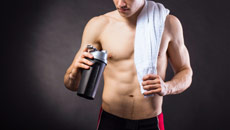A mouthwash made from herbal concoction, prescribed in ayurveda, helps in reducing the intensity of pain in patients undergoing radiation therapy for oral cancer.
The mouthwash developed, clinically tested and patented by the Rajiv Gandhi Centre for Biotechnology (RGCB) -- a premier institute under the Department of Biotechnology along with the Regional Cancer Centre in Kerala, also combats ulcers and infections.
RGCB director M. Radhakrishna Pillai said: "The herbal mouthwash, by mitigating the toxicity associated with radiation therapy, could have a significant impact on improving the treatment continuity and cure rates for oral cancer."
He was speaking at a research conclave titled "Ayurveda Inspired Discovery", held as part of the Sixth World Ayurveda Congress (WAC) here Saturday.
He said: "The mouthwash is a simple supernatant liquid obtained by dissolving in water equal quantities of powdered dried leaves and bark of neem (Azadiracta indica); fruits of amla (Emblica officinalis), yellow myrobalan/haritaki (Terminalia chebula) and beleric myrobalan/bibhitaki (Terminalia bellirica); and dried liquorice (Glycyrrhiza glabra) roots."
He said that all the plants used to make the herbal mouthwash are well documented in ayurvedic texts as having anti-microbial, anti-inflammatory, mucolytic or analgesic properties, found effective individually or in various combinations.
Researchers at the Kerala-based RGCB believe these properties can be extended to relieve the problems associated with oral mucolitis, a painful side-effect of radiation therapy given to oral cancer patients.
A randomised controlled clinical trial of the product on 148 oral cancer patients is going on.
According to the trial, around half the patients were administered the herbal mouthwash four times daily and the rest were put in a control group given soda saline mouthwash. They were assessed weekly by a physician, who was blinded to the randomisation, for mucositis, pain and use of pain-killers, antibiotics and anti-fungals.
"By Day 22 of the treatment, when the radiation is most damaging, patients in the group administered the mouthwash had significantly lower pain and reduced use of analgesics and antibiotics compared to the control group."
"Over a six-month period, these patients experienced less dryness of mouth, had lower intolerance to spicy food and overall better quality of life," said the trial reports.
As per the WHO, oral cancer is the 11th most common cancer globally and two-thirds of the cases are in developing countries.
Pillai said: "The intensity of pain is a major limiting factor in radiotherapy. The mouthwash itself may not have anti-cancer properties, but by reducing toxicity it lowers treatment cost and hospitalisation while allowing patients to complete their treatment."





